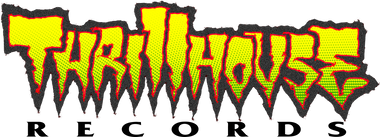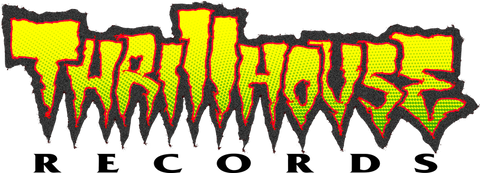
VARIOUS – Bloodstains Across Yugoslavia
FREE SHIPPING ON ORDERS OVER $75.00!
"The subtitle here tells half of the story, but what it doesn’t hint at is the range of musical styles encompassed by the term “punk” in the period covered by the compilation, 1978 – 1980. For those too young to remember, Yugoslavia was, in that period, an independent socialist republic, generally considered part of the Eastern bloc by the west, but under the dictatorship of Marshal Tito almost as isolated from the USSR and East Germany as it was from the capitalist world of western Europe and the USA. Stretching from what is now Slovenia in the north to Macedonia in the south, it was a sprawling, multicultural, multilingual nation where tensions often ran high. Under Tito, Yugoslav culture was a strange mixture of repressive, authoritarian communism and quasi-western consumerism, and compared to the more insular USSR and East Germany, Yugoslav popular music went through the same familiar evolutions that western music did; from rock ‘n’ roll to beat music and pop, to psychedelia, folk, prog, jazz-rock, heavy rock and disco. Not surprisingly, with that kind of musical orthodoxy, Yugoslavia was also the first socialist state to produce a homegrown punk scene and, indeed, most of the bands represented on Bloodstains… also appeared on the epoch-making Novi Punk Val (“New Punk Wave”) compilation released in 1981 by ZKP RTLJ, one of Yugoslavia’s biggest labels at the time, making this, by the standards of such things, a fairly overground collection of underground music.
The majority of the bands on the Novi Punk Val album – and this one – were from the Slovenian and Croatian scenes, which means that, as an overview, Bloodstains Across Yugoslavia is a little skewed as it doesn’t feature many of the Serbian groups of the time. Some of those – notably Idoli, Radnička Kontrola and Šarlo Akrobata were among the best Yugoslav punk/new wave bands of all, but to make up for their absence, Bloodstains.. features a handful of tracks by one of the first and most popular Serbian punk bands, Belgrade’s Pekinška Patka (“Peking Duck”.) As their name suggests, Pekinška Patka were not, ideologically speaking, one of the heavier bands of the era, but nevertheless the album opens with a couple of their storming classics. Those two songs are in fact both sides of the band’s second single, “Bolje Da Nosim Kratku Kosu”/”Ori Ori” from 1980. The A-side is a catchy new wave anthem about the new wave, light-hearted but full of attitude, the gist being that long hair and hard rock is old news and punk is here to stay. It’s an energetic, fun record, not unlike UK bands of the time like The Vapors or The Undertones. “Ori Ori” is more of the same but even more energetic and anthemic, and the two songs provide an easy way into a well-rounded and satisfying album, even if it’s sometimes mysterious to those of us who don’t understand the lyrics. Slovenia’s Pankrti are a very different prospect, confrontational and political, and their sound is more hard-edged and raw than Pekinška Patka’s was. Their “Lepi in Prazni” (“Beautiful and Empty”) from 1978 has a blunt, impassioned Clash/Sham 69 kind of sound, but is every bit as catchy as the Pekinška Patka tracks. Likewise, Paraf were one of the first Croatian punk bands and their jagged 1978 single “Moj Zivot Je Non Val” is another catchy song with pleasant echoes of The Ramones’ “Today Your Love, Tomorrow the World.”
On the evidence of Bloodstains… The Clash were far more of an influence on Yugoslavian punk than the Sex Pistols and a good proportion of the bands on the compilation clatter and rant through 2-minute bursts of ragged guitars and feral energy. But there’s more to it than just first generation punk; Croatian band Prljavo Kazalište certainly have enough energy and attitude to fit easily into the punk pigeonhole, but their “Majka” (1978) also has echoes of distinctly un-punk bands like Status Quo in its driving rock groove. Problemi’s ebullient, Buzzcocks-like “Grad Izobilja” was a highlight of Novi Punk Val and it stands out here too, for its ranting rawness and pop hooks. Termiti were another Novi Punk Val band and they stand out too, thanks to a Seeds/Doors-esque organ that makes them come across more as a supercharged ‘60s garage band than classic ‘70s punk. Occasionally, the sequencing of the album leaves a little to be desired: a trio of very similar – though all good enough – raucous, Clash-like songs by Slovenia’s Kuzle would have been better spread out over the record instead of together and likewise three songs later on by Pankrti, which again are individually all good, but blur into each other when side by side. When you have the variety that this compilation has – where anthems like Lublanski Psi’s incendiary “TV (Ecerna Revolucija)” stand out partly because they appear between very different sounding groups – it feels like a slightly missed opportunity, assuming that anyone actually listens to a compilation album in sequence these days.
An unlikely highlight is Pekinška Patka’s (very) punked-up version of French smooth-crooner Alain Barrière’s suave 1963 Eurovision cheese-ballad “Elle était si jolie,” covered as “Bila Je Tako Lijepa,” which is great fun, but it wilts somewhat in the face of a pair of authentic punk rock blasts from Paraf and the three even more 1977-sounding (though actually 1980) Pankrti tracks. As if to make up for “Bila Je Tako Lijepa,” the album gives Pekinška Patka another go, ending with two of their most punk/Oi!-sounding songs; “Kratkovidi Magarac” and the gritty, Clash/Anti-Nowhere League-flavoured rampage “Kontracepcija.” In many ways, punk is a genre best explored via compilations and mixtapes and though Bloodstains Across Yugoslavia isn’t perfect, it’s an excellent, exhilarating introduction to one of the most vital punk and new wave scenes of the late ‘70s and early’80s. It’s likely to leave newcomers to the delights of Eastern bloc punk wanting more and, luckily, there’s a lot out there to explore."
- Will Pinfold, Spectrum Culture

